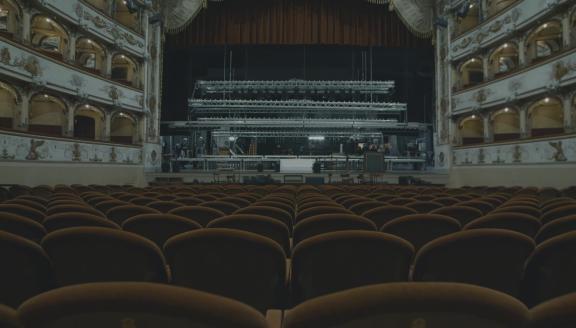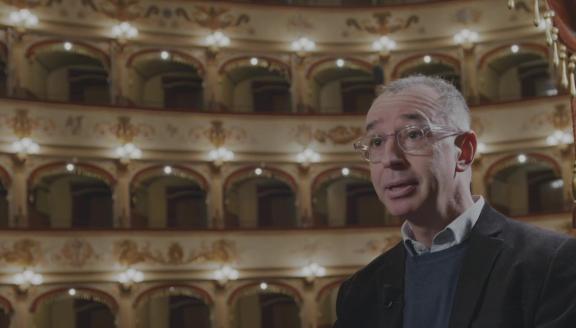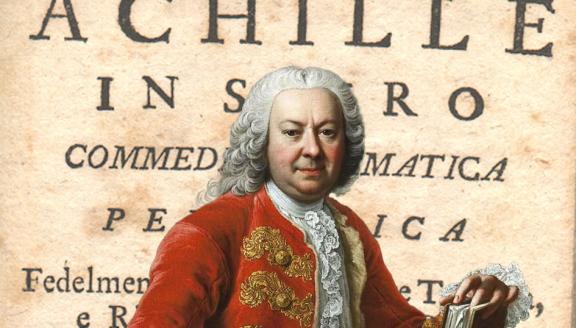Catone in Utica

Catone in Utica is the story of the power struggle between two giants of the Roman world, the dictator Julius Caesar (Cesare) and Cato the Younger (Catone), the upholder of traditional republican ideals. This battle of political wills forms the backdrop to the military action in which Cesare and Catone are engaged in 49-48 BC and to an involved secondary love plot.
Catone in Utica was staged for the first time in 1737 in Verona and is one of the last operas by Antonio Vivaldi. Although only Acts II and III survive, this work is considered to be one of the greatest operatic compositions of the Venetian composer. After the successful staging of Vivaldi’s Farnace in December 2021, Teatro Comunale di Ferrara ‘Claudio Abbado’ offers a a chance to discover live a rarely-performed production by the 'red priest', as Vivaldi was known. The production is conducted by Federico Maria Sardelli - who is also an essayist, composer, painter and satirist - and directed by Marco Bellussi. To elegant designs by Matteo Paoletti Franzato, part of the action is set in a villa, perhaps the private retreat of Emilia, Pompey’s widow, a central figure in the unfolding of events. The collision and the competition between Cato and Caesar takes place on a playing field, where Cato’s weakness emerges. The sets and the costumes (the latter by Elisa Cobello) have classical and contemporary aspects, framing a universal drama of private emotions intertwined with political intrigue.
Cast
|
Catone
|
Valentino Buzza
|
|---|---|
|
Cesare
|
Arianna Vendittelli
|
|
Emilia
|
Miriam Albano
|
|
Marzia
|
Valeria Girardello
|
|
Fulvio
|
Chiara Brunello
|
|
Arbace
|
Valeria La Grotta
|
|
Orchestra
|
Orchestra Barocca Accademia dello Spirito Santo
|
| ... | |
|
Music
|
Antonio Vivaldi
|
|---|---|
|
Text
|
Pietro Metastasio
|
|
Conductor
|
Federico Maria Sardelli
|
|
Director
|
Marco Bellussi
|
|
Sets
|
Matteo Paoletti Franzato
|
|
Costumes
|
Elisa Cobello
|
|
Lighting
|
Marco Cazzola
|
|
Video
|
Creativite
|
|
Assistant director
|
Elisabetta Galli
|
| ... | |
Videos
STORY
Marcus Porcius Cato, Cato the Younger, later known as Uticensis, is opposed to the fall of the Roman Republic. Taking full advantage of the support of the Numidian Prince Arbace, Cato organises the resistance of the Pompeian Party against Caesar. He attempts to overturn the victory of the Caesareans, indignantly opposing the peace offers which arrived, first from the Senate (through Fulvius), and then from Caesar himself, who, having reached out in person, is greeted with the most blatant contempt by Cato.
Within this context, the love interest takes a background role. It involves primarily the love between Catone’s daughter Marzia and Caesar, revelation of which does not please her father, a heroic man whose stubborn pride is his Achilles heel. Catone’s ally, the Prince Arbace, also loves Marzia, while a secondary couple is formed by Pompey’s widow Emilia and the Roman legate Fulvia, though Emilia is rather more interested in revenge on Ceasar than romance.
A conspiracy is organised to assassinate Caesar. Emilia, to avenge the death of her husband Pompey, tempts Caesar to an old aqueduct, where assassins lie in wait. The arrival of Marzia and Cato delays the enactment of the cunning plan, which is then entirely thwarted by the entry of Caesar's troops into Utica. Cato is persuaded not to commit suicide, while the victor generously forgives his enemies.
The denouement in the first version of the libretto was unusual, with the defeated Cato dying on stage after stabbing himself and Caesar lamenting the loss of his one-time friend in a final few lines of plain recitative. It was a genuinely tragic denouement that did not go down well with Roman critics. Metastasio, ever sensitive to criticism, subsequently produced the above-mentioned second, less austere ending used by Vivaldi.



